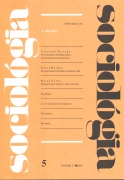Bezpečnostný sektor a jeho reforma
Security Sector and Its Reform
Author(s): Matúš KorbaSubject(s): Social Sciences
Published by: SAV - Slovenská akadémia vied - Sociologický ústav
Keywords: Security sector; reform; democratic control; power institutions
Summary/Abstract: Security Sector and Its Reform. Throughout history, there have been many cases referring to the misuse of the power by one of the state’s power institution. Most frequently there were the armed forces, which as the strongest power instrument dislocated from control. Modern era brought gradual strengthening of the next power institution such as police, intelligence services or internal security agencies. The parallel process to this strengthening was the increasing threat of abusing of the stressed institutions. The violent overthrow of the government is the extreme demonstration of the power instruments interference in the state functioning. There are also other more typical cases, such as influencing political life, discrimination of the internal opponents, or pursuing particular financial or economic gains. The dominant role of some of those institutions in political system lead to societal decline and to the spread of negative characteristics like corruption and clientelism. A precondition of the democratic system and for market economy functioning is democratic control and public oversight of the state’s power institutions. The first key task of those mechanisms is to prevent manipulating with power instruments by political groups, which are trying to promote their own interests. The second key task is to prevent potential abuse of those institutions by their own members or by their command officers. On the basis of the mentioned facts, the civil society and the democratic state are creating a complex of formal relations and informal rules with the aim to ensure the accountable and transparent functioning of the whole power apparatus. In traditional democracies and in the countries undergoing democratic transformation process, one rule is valid - the mechanisms of the political control and public oversight over the armed forces, police, intelligence services and internal security agencies are the precondition for effective state governance, and for sustainable development of civic society. The formation of these mechanisms is shaping by historical experiences with civil – military relations. Even if the character of political systems and of the society structure did change in the course of history, the main problem stays unchangeable. It is the issue of how to include the armed forces into the society in order not to be the latent threat (in the form of the misuse of their power potential on illegitimate political or individual aims). The theory of the civil – military relations deals with the main principles of the balance between the armed forces efficiency and its subordination to the democratic control and civil/public oversight. This process has been evolving for the past five decades. This balance depends on the harmonisation of the prerequisites, with the aim to create accountability of the armed forces towards political authority and transparency towards the public. Equal aim is to retain the efficiency of the armed forces.
Journal: Sociológia - Slovak Sociological Review
- Issue Year: 2003
- Issue No: 5
- Page Range: 433-452
- Page Count: 20
- Language: Slovak

